Many have written and asked for the words to a particular "ordinance" as performed by the Church of Jesus Christ of Latter-day Saints. We found a very old card in a 1920 copy of the Book of Mormon with the following information. It was published by the LDS church.
SUGGESTION FOR ORDINANCE WORK
General Information
In
using this folder of suggestions for ordinance work, it should be borne in
mind that no definite language has been established except for the blessing
on the Sacrament and for baptism and confirmation. The Lord's reason for
not revealing set forms for other ordinances may be that He did not want
His Priesthood to perform them in a stereotype manner for fear that in time
formalism would result in the loss of the inspiration of the Holy Spirit.
(Note:
During the 15 years of membership in the Mormon church, I witnessed first hand that most all of the ordinances
performed in the LDS church were all performed almost verbatim to the
following "suggestions.")
It
is realized, however, that many who hold the Priesthood have had limited
experience in officiating in certain of the ordinances and this folder has
been prepared by way of suggestion and aid to them.
Bruce
R. McConkie, The Mortal Messiah, Vol.2, p.147 - p.148
"But thou—who hast come into the fold of Christ, and who thereby know
better than to follow these mocking imitations of true prayer—"when
thou prayest, enter into thy closet, and when thou hast shut thy door, pray
to thy Father which is in secret; and thy Father which seeth in secret
shall reward thee openly." And further: "When ye pray, use
not vain repetitions, as the hypocrites do; for they think
that they shall be heard for their much speaking." The
repetitious chants, the thoughtless "Hail Mary's," and the
memorized "Our Father's" of modern Catholicism, the repeated
mouthings of the poetic phrases of the prayer book—vain
repetitions!—these are included in what Jesus here condemns. Prayers
that ascend beyond the ceiling, to be heard before the Throne in the
sidereal heavens, must be uttered "with all the energy of heart,"
as Mormon's colloquial expression puts it. (Moro. 7:48.)
 |
BLESSING OF CHILDREN The child is taken in the arms of the Elders; and the Elder who is voice may begin in substance. "Our Father in Heaven", in the name of Jesus Christ and in the authority of the Holy Priesthood we present before Thee this infant to give him/her a name and a blessing. And we give him/her the name of ______." To this may be added such words of blessing as the spirit may dictate. (The effect of this ordinance is that the child now becomes what is known as a "member of record." At the age of eight years old the child is an eligible candidate for baptism, if worthy, and thereby becoming a member of the church.)
|
 |
|
|
BAPTISM
The
officiating Elder should hold securely in his left hand the hands of the
person being baptized. He should raise his right hand and arm to the square
and calling the candidate by name, say: "______
having been commissioned of Jesus Christ, I baptize you in the name of the
Father, and of the Son, and of the Holy Ghost. Amen" The right hand
should be placed on the back of the head of the candidate, he or she should
be completely immersed and then assisted in "coming up out of the
water."
|
|
|
|
CONFIRMATION |
|
 |
ORDAINING TO THE AARONIC PRIESTHOOD Calling the candidate by name "_________, by (or in) the authority of the Holy Priesthood I (or we) lay my (or our) hands upon your head (for Deacons or first ordination only) and confer in the Priesthood' of Aaron upon you) and ordain you a (Deacon, Teacher of Priest) in the Church of Jesus Christ of Latter-day Saints, and confer upon you all the rights, powers, and authority pertaining to the office and calling in the Aaronic Priesthood, in the name of the Lord, Jesus Christ, Amen" Such words of blessing as the spirit may dictate may be included.
|
.jpg) |
.jpg) |
ORDAINING TO THE MELCHIZEDEK PRIESTHOOD Calling the candidate by name"________, by (or in) the authority of the Holy Priesthood, I (or we) lay my (or our) hands on your head and (First ordination to Melchizedek Priesthood) confer upon you the Melchizedek Priesthood and ordain you an Elder (or Seventy or High Priest) in the Church of Jesus Christ of Latter-day Saints, and confer upon you all the rights, powers, and authority pertaining to this office and calling in the Holy Melchizedek Priesthood, in the name of the Lord, Jesus Christ, Amen." Such words of blessing as the spirit may dictate may be included.
|
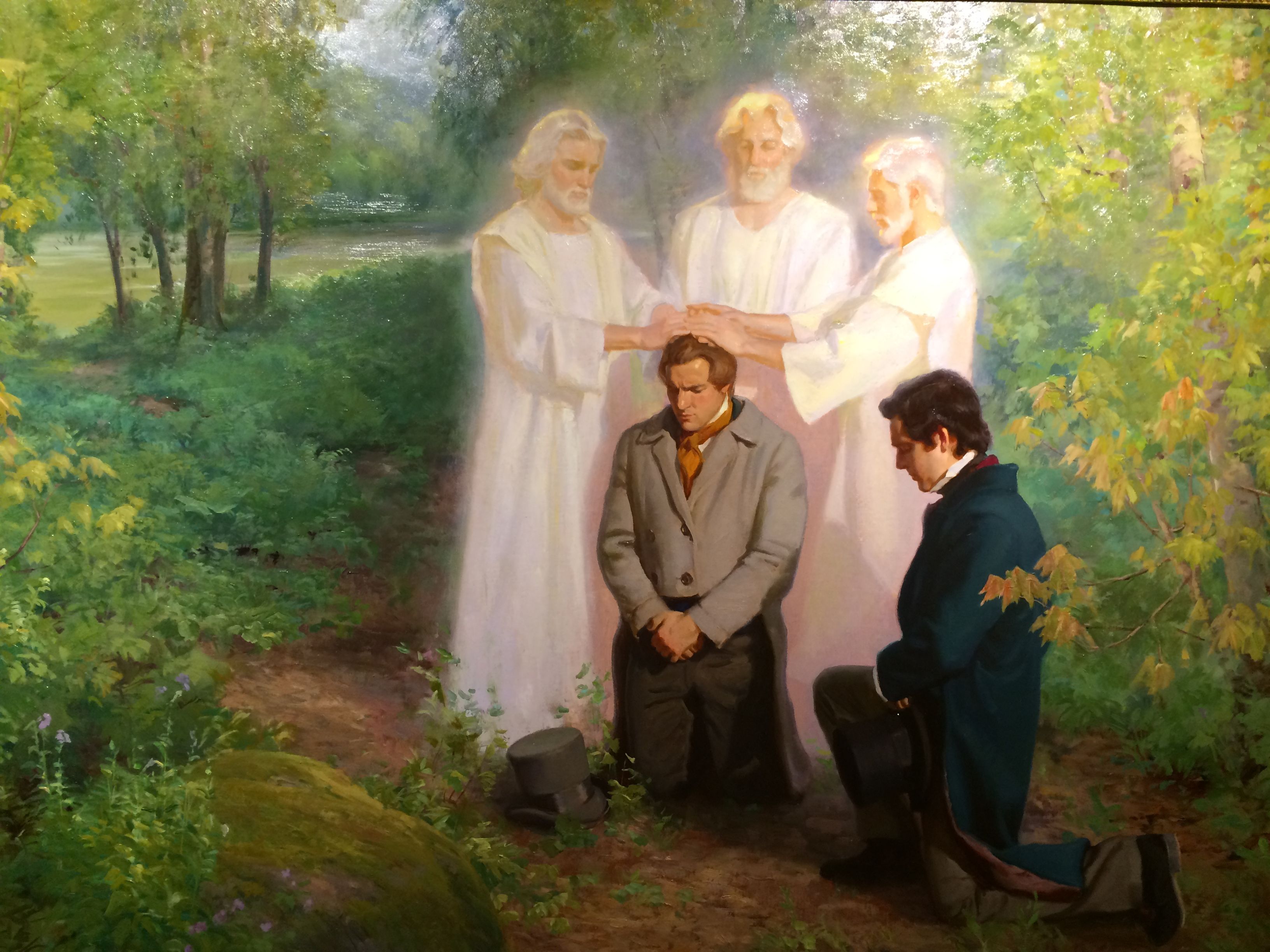 |
|
The
following types of repetitious prayer goes on every Sunday in the Church of
Jesus Christ of Latter-day Saints. The Sacrament Prayer in most cases is
recited by young men. This prayer is usually typed on a small piece of
paper (like a 3X5 card) that is taped to a small metal pull out shelf at
the Sacrament Table. As the shelf is pulled out it turns a microphone on
that is built into the shelf. As the boy kneels to give this
"prayer" he reads what is before him . This "prayer" is
found in the Book of Mormon in Moroni 4:3 and Moroni 5:2. (NOTE:
The wording has been changed from what is revealed in the Book of Mormon.
The word wine found in the Book of Mormon has been replaced with the word
"water" in today's version of these prayers. I guess the Book of
Mormon God made a mistake!) |
||
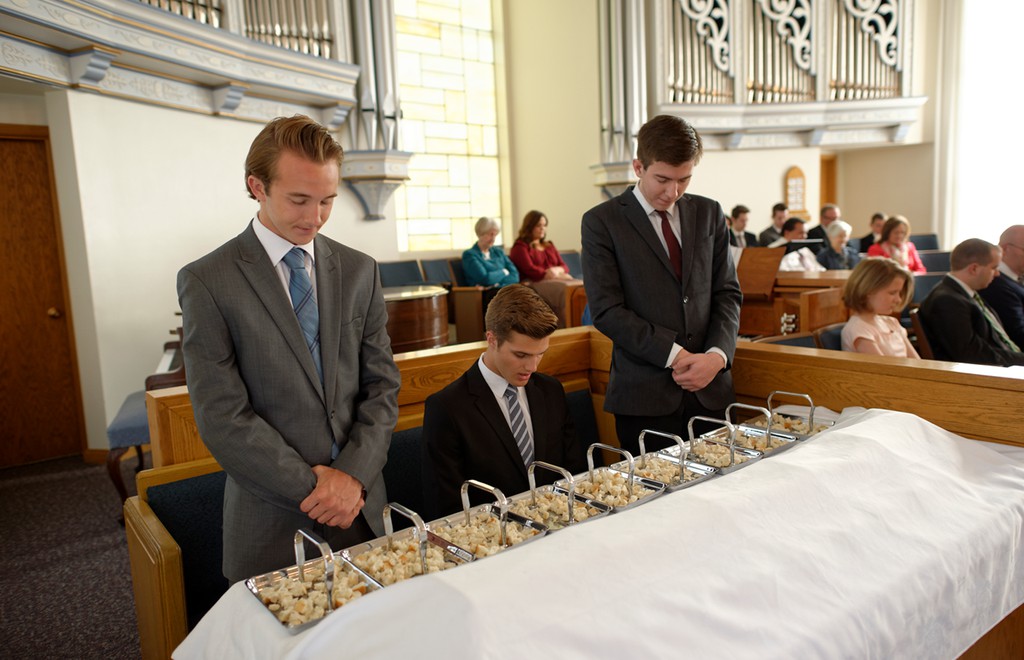 |
BLESSING OF THE BREAD "O God, the Eternal Father, we ask thee in the name of thy Son, Jesus Christ, to bless and sanctify this bread to the souls of all those who partake of it, that they may eat in remembrance of the body of thy Son, and witness unto thee, O God, the Eternal Father, that they are willing to take upon them the name of thy Son, and always remember him and keep his commandments which he hath given them; that they may always have his Spirit to be with them. Amen." (It is important to mention how strongly it is stressed that these exact words be said when performing this ordinance. If the young man makes any mistake in saying this prayer he must start over again until he gets this "prayer" correct. During which time he is making these mistakes out-loud in front of the entire congregation or ward. This must be very stressful on anyone, let alone a teenager who is already having different issues of acceptance in his personal life and in living up to what his church and family expect of him.) |
 |
 |
BLESSING OF THE WATER "O
God, the Eternal Father, we ask thee in the name of thy Son, Jesus Christ,
to bless and sanctify this water to the souls of all those who drink of it,
that they may do it in remembrance of the blood of thy Son, which was shed
for them; that they may witness unto them, O God, the Eternal Father, that
they do always remember him, that they may have his Spirit to be with them.
Amen." (It is important to mention how strongly it is stressed that these exact words be said when performing this ordinance. If the young man makes any mistake in saying this prayer he must start over again until he gets this "prayer" correct.)
|
 |
 |
CONSECRATING
OIL
The Elders should hold the bottle of olive oil from which the stopper have been removed and consecrate it under the inspiration from the Holy Spirit. The one speaking may say in substance: "Our Father in Heaven, we present before Thee this oil, and in the authority of the Priesthood we consecrate it, and dedicate it, and set it apart for the authority and blessing of the sick, in the name of Jesus Christ. Amen." Care should be taken to dedicate the oil and not the container. |
 |
.jpg) |
ANOINTING
THE SICK
A few drops of consecrated oil should be poured upon the head of the sick person. One Elder then lays his hands on the person's head, and may say in substance; "________, in the name of Jesus Christ and in the authority of the Holy Priesthood I lay my hands upon your head and anoint you with this oil which has been dedicated for the blessing of the sick to the end that you may be made whole and restored to health." |
 |
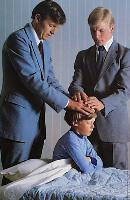 |
SEALING
THE ANOINTING
Two or more Elders lay their hands on the head of the sick person, who has been anointed, and the one speaking may say in substance; calling the individual by name "________, in the name of Jesus Christ and in the authority of the Holy Priesthood we seal and confirm upon you the anointing of the consecrated oil with which you have been anointed to the end that the blessing pronounced in this administration may be realized." To this may be added such words of blessings as the Spirit may dictate. |
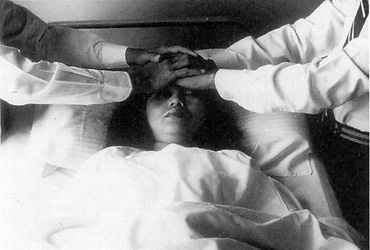 |
.jpg) |
DEDICATING GRAVES Graves may be dedicated either with or without the authority of the Priesthood. The one offering the prayer may begin: " Our Father in Heaven, as we surround this open grave we dedicate and consecrate this spot of earth as the final resting place for the body of ________." To this may be added a supplication that this spot of earth may be hallowed place to which the kindred may come, and that the time appointed for its resurrection the body may again come forth reunited with the spirit.
|
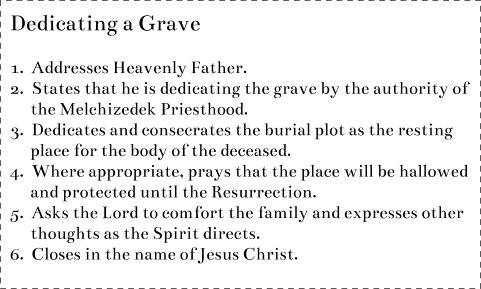
|
 |
DEDICATING
HOMES
Church members may have their homes
dedicated by the authority of the Melchizedek Priesthood. Homes do
not need to be owned or free of debt to be dedicated. Unlike Church
buildings, homes are not consecrated to the Lord. A home is dedicated by a Melchizedek
Priesthood holder. If there is not a Melchizedek Priesthood holder
in the home: A family may invite a close friend,
relative, or ministering brother who holds the Melchizedek
Priesthood to dedicate the home. The person does not need to seek
approval from a priesthood leader. A family might gather and offer a prayer as
guided by the Spirit. The prayer could include the elements like
dedicating the home as a sacred place where the Holy Spirit can
reside and gives other words as guided by the Spirit. For example,
he might bless the home to be a place where family members can
worship, find safety from the world, grow spiritually, and prepare
for eternal family relationships. Close in the name of Jesus Christ.
|
.jpg) |
 |
PATRIARCHAL BLESSINGS Every worthy,
baptized member is entitled to receive a patriarchal blessing, which
provides inspired direction from Heavenly Father. Parents and Church
leaders encourage members to prepare spiritually to obtain their
patriarchal blessings. RECEIVING A PATRIARCHAL
BLESSING If a patriarchal blessing does not include a declaration of lineage, the patriarch may later give an addendum to declare lineage. |
 |
All of the ordinances and blessings with full instructions can now be found here from the
General
Handbook: Serving in The Church of Jesus Christ of Latter-day Saints
Let's take a quick look into the fact that in the Mormon Temple repetitious chants and prayers are said and repeated exactly the same each time a person attends a particular ceremony. There are only two instances were the wording varies somewhat, and then it is only a one word change. We list those variations here for your convenience.
|
|
During your first visit to the temple in the Washing and Anointing or Initiatory Ceremony, you are given a "new name". It will later be used in the Endowment Ceremony and be revealed that the "new name" is also the name of the First Token of the Aaronic Priesthood. This new name will be used as one of the passwords to get through the veil. |
|
|
If
going through an Endowment Ceremony for the dead you would receive the
name of that dead individual as well as the "new name" which
again you will use later during the Endowment Ceremony. |
|
|
In
the Endowment Ceremony, the "name" of the Second Token of
the Aaronic Priesthood. The name of this token, is the first given
name, if you are going through the temple for your own Endowment, or
if you are going through for the dead, it is the first given name of
the person for whom you are officiating. Again, this name will be used
as one of the passwords to get through the veil. |
*Added